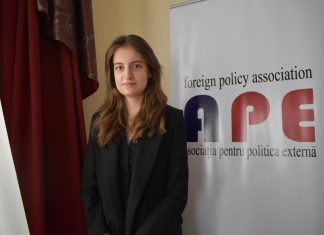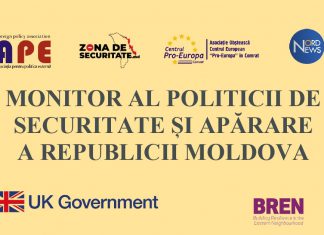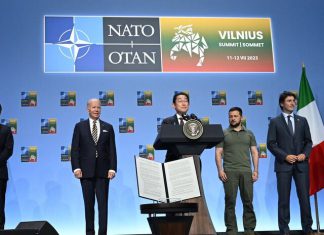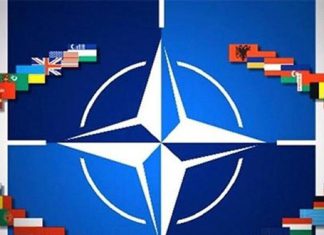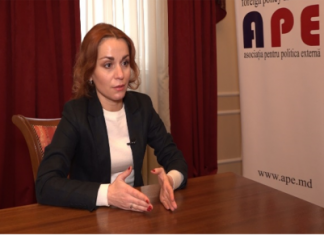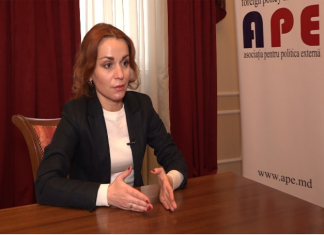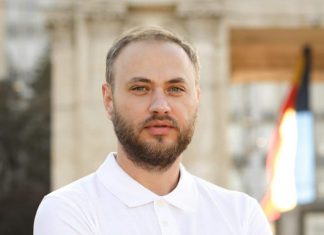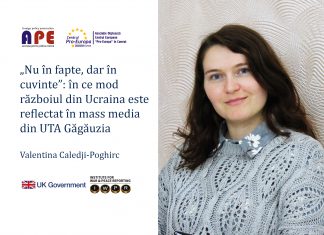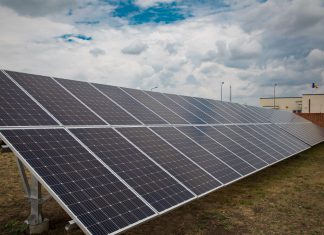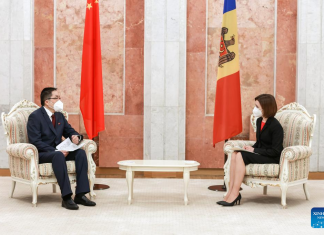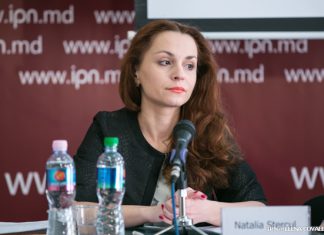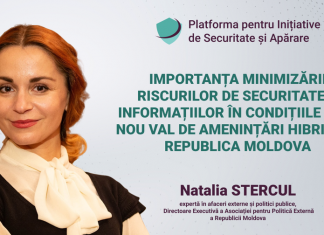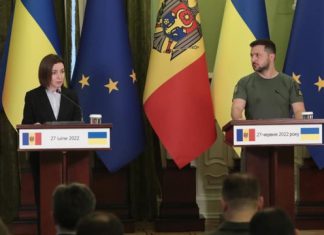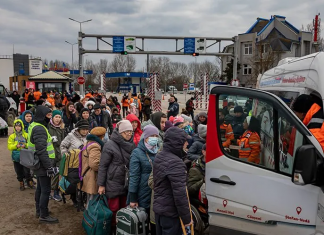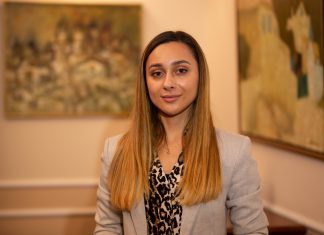Николета АДАМ: Возможности повышения устойчивости к гибридным угрозам в контексте осенней предвыборной битвы
Николета АДАМ, Ассоциация Внешней Политики (APE)
Предвыборная битва осенью станет проверкой поддержки правящей партии избирателями и задаст тон предстоящим президентским и парламентским выборам. Местные выборы, проводимые в соответствии с положениями нового Избирательного кодекса, 5 ноября...
Мониторинг Политики Безопасносности и Обороны Республики Молдова, Июль-Август 2023
Ассоциация Внешней Политики (APE) запускает серию ежемесячных бюллетеней, посвященных мониторингу политики безопасности и обороны Республики Молдова. Монитор Политики Безопасности и Обороны подготовлен в рамках проекта “Усиление участия гражданского общества в защите национальной безопасности в...
The Outcomes of the NATO 2023 Summit in Vilnius
BRIEF INFORMATION AND ANALYTICAL NOTE
Natalia STERCUL, Nicoleta ADAM,
Foreign Policy Association
Lithuania hosted this year’s NATO Summit on 11-12 July 2023, a historic gathering that shaped the future of the Western Alliance and addressed the most...
Chronicles of NATO Summits and their Decisions after the start of Russia’s Full-Scale War...
Natalia STERCUL, Nicoleta ADAM,
Foreign Policy Association of the Republic of Moldova
The NATO Summit in Vilnius, which will take place on July 11-12, 2023, will be the fourth since the start of Russia's war in...
Natalia Stercul: Security and Synergies — The Importance of the Black Sea Region and...
The geostrategic potential of the Black Sea region has often been overlooked. Natalia Stercul analyses why this is changing in the face of the war, what economic perspectives are open to the EU and...
Думитру Пелин: Отражение войны и кризиса беженцев в местных СМИ на севере Республики Молдова
Думитру ПЕЛИН
NORD NEWS
Спустя почти год после начала русско-украинской войны, за которой последовал миграционный и энергетический кризис, жители севера Республики Молдова остаются уязвимыми перед манипуляциями, фейковыми новостями и пропагандой. В первые месяцы после начала катастрофы,...
Наталья Стеркул: О диапазоне использования Россией инструментов гибридной войны и ответных мерах Молдовы в...
Наталья СТЕРКУЛ
Ассоциация Внешней Политики Республики Молдова
Инструменты гибридной войны, используемые Россией, имеют достаточно обширный диапазон применения, который постепенно все больше расширяется. Война России против Украины наглядно продемонстрировала это. Наряду с прямыми военными действиями, атаками, направленными...
Виталие Гуцу: Война России против Украины и кризис с беженцами в соседней стране: „немые...
Виталие ГУЦУ
ZONA DE SECURITATE.MD
Спустя почти год после того, как Российская Федерация развязала войну на территории Украины, сообщения о текущей ситуации на поле боя или статусе украинских беженцев в странах, куда им удалось попасть, по-разному...
Валентина Каледжи-Погирк: «Не делом, а словом»: как СМИ в Гагаузии освещают войну в Украине
Валентина КАЛЕДЖИ-ПОГИРК,
Общественное Объединение Европейский Центр
“Pro-Europa” в Комрате
В Гагаузии присутствие российской новостной повестки ощущалось остро и до начала войны в Украине. Однако, после февраля 2022 года ситуация с распространением фейковых, пропагандистских и дезинформирующих...
Сорин Шклярук: Молдо-китайское сотрудничество в области возобновляемой энергетики
В настоящее время экология и возобновляемые источники энергии стали важными темами мировой, политической повестки дня. Классические источники энергии, такие как древесина, уголь, нефть или природный газ, имеют свойство заканчиваться, а также использоваться в качестве...
Сорин Шклярук: Молдо-китайские экономические отношения: инфраструктурные проекты и инициатива «Один пояс – Один...
Важным инструментом в процессе углубления экономических отношений между Китаем и его партнерами является сотрудничество в рамках инициативы «Один пояс - один путь» (BRI). При конструктивном подходе и согласованностью последовательных действий сотрудничество Республики Молдова и...
Сорин Шклярук: Динамика и перспективы молдавско-китайских торгово-экономических отношений
С момента обретения независимости до настоящего времени, динамика молдавско-китайских отношений характеризовалась взаимным уважением сторон, готовностью к сотрудничеству и поиску консенсуса, а также пониманием важности поддержания и развития двустороннего сотрудничества. В контексте нынешних реалий, Республика...
Наталья Стеркул: Сложности и пределы возможностей в управлении кризисом беженцев “маленькой страны с большим...
Наталья СТЕРКУЛ
Ассоциация Внешней Политики Республики Молдова
“Молдова - маленькая страна с большим сердцем” – новый слоган прочно вошедший в международный обиход с начала войны России против Украины, ставшей абсолютно новой драматической реальностью, навсегда радикально изменившей...
Игорь Гусейнов: О механизме реагирования на проблемы регламентации кризиса беженцев в АТО Гагаузия
Игорь ГУСЕЙНОВ,
Общественное Объединение Европейский Центр
“Pro-Europa” в Комрате
Не успев восстановиться после беспрецедентных вызовов XXI века, связанных с пандемией, Республика Молдова столкнулась с еще более сложными и непредсказуемыми трудностями. Вооруженный конфликт на Украине взбудоражил...
Думитру Пелин: Украинские беженцы севера Республики Молдова: между дискриминацией и сочувствием
Думитру Пелин
NORD NEWS
С начала российского вторжения в Украину Республика Молдова столкнулась с крупнейшим миграционным кризисом в своей современной истории. Многие жертвы ужаса и преступлений, организованных Владимиром Путиным в соседней стране, нашли приют и поддержку...
Виталие Гуцу: Хроники украинских беженцев в Приднестровье и населённых пунктах Зоны безопасности
Виталие ГУЦУ
ZONA DE SECURITATE.MD
Проблема украинских беженцев остается крайне актуальной даже спустя 300 дней с начала войны, развязанной Российской Федерацией, в соседней стране. Точки размещения беженцев на «карте» Республики Молдова разнообразны. В нашем материале мы остановимся...
Наталья Стеркул: Важность минимизации рисков информационной безопасности в условиях новой волны гибридных угроз в...
Гибридные угрозы как неотъемлемая часть полномасштабной войны России против Украины приобретают новые все более изощренные формы диверсионных действий. Диапазон применения гибридных тактик и стратегий стремительно расширяется. Республика Молдова будучи соседним с Украиной государством окунулась...
Natalia Stercul: Moldova’s reaction on the Russian full-scale war against Ukraine and its consequences
MOLDOVA’S REACTION ON THE RUSSIAN FULL-SCALE WAR AGAINST UKRAINE AND ITS CONSEQUENCES
Natalia Stercul
Foreign Policy Association
Abstract
Russia’s war in Ukraine has been an exceptional threat to the European security architecture, and a peaceful and democratic development...
Victoria Rosa: European values at the core of unprecedented Moldovan humanitarian efforts amidst the...
Moldova, A country in the heart of Europe, its current leadership and first and foremost its people, opened not only its borders but also their homes for the suffering neighbours. The war in Ukraine has...
Ludmila Nofit: Challenges and prospects for the cooperation between the Republic of Moldova and...
The Editorial release “Views on the Future of Europe from the EU’s Neighbouring Countries”, initiated by the European Institute of Romania, gathered the contributions of 23 experts from the Western Balkan countries (Albania, Bosnia...


